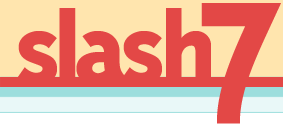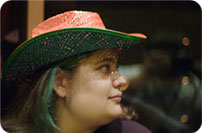On being meta.
Be meta. Try to become a meta designer, or meta whatever area you are in. What being meta means is to look not just at the details of what you are doing, be it design or business or whatever, but take the big picture view, the ‘meta’ view, and see how every action you take has a larger impact above and beyond the obvious.
— Richard Farson [1]
(author of the supremely excellent Management of the Absurd)
Design, development—as a profession, each so full of itself that it’s liable to pop and spray oily, self-aggrandizing drops all over everyone and everything.
I think this arrogance is the same kind of arrogance as your mom explained about that awful kid who bullied you in elementary school: insecurity. Jealousy. A permanent sense of being the small dog in compared to the people who really make the world turn—whether those are the suits, the clients, design vs dev, dev vs design. And we all know what small dogs are famous for: Getting their little hackles up. Growling at the big dogs, who really have no idea what’s going on.
What’s funny about this is, that very arrogance keeps us all down. Being so damn sure you’re the hottest damn thing on wheels makes it kinda difficult to admit that maybe tracks are actually the way to go.
Being meta, as Richard says, is one of the cures for this particular professional disease. It makes you reach outside yourself and your comfort zone:
At this time, no profession is organized to meet its true goals.
Take psychology. Since one quarter of the world’s people have serious psychological difficulties, even if we doubled the size of the mental health professions and worked around the clock our effect would be infinitesimal. We must find ways to use lay resources, paraprofessionals, mass media, Internet, automated systems, etc.
Similarly, every profession must become a metaprofession—find ways for others to use what we know.— Richard Farson (notes)
I’ve believed for a long time now that giving away what I know—and doing it in the most effective way I can—is so much more valuable to the world (and to me) than guarding it jealously in case I might possibly lose a dollar or a sale somewhere. “Eat like a bird, poop like an elephant,” as Guy Kawasaki writes.
But Richard’s call to be meta goes even further. More even than breaking down the walls that protect our esoteric, proprietary knowledge, he’s advocating that we use any tool we can to remove ourselves from the equation, period. Admit that we can’t reach, help, serve, or guide everyone who might want to be reached, helped, served or guided by us—give up on that particular thing, because it will never happen, even if we were hyper-organized superbeings—and work on the next best thing.
Basically he’s saying we should all try to leverage ourselves out of a job.
Except that, if we’re really as good as we think we are, there will never be a lack of work for someone who can not only do the job at hand right now, but who can also go beyond those boundaries and create systems that work when we cannot.
Being able to cross those professional boundaries is a badge of honor, maturity, and healthy self-confidence—it shows you’ve got the professional cajones to put part of what you’re doing out there for free, and that you believe you won’t suffer for it.
It also means you get cross-culture experience. There is nothing more valuable than having skill x and adding to it writing, teaching, designing, speaking, communicating. As Scott Adams says:
Capitalism rewards things that are both rare and valuable. You make yourself rare by combining two or more “pretty goods” until no one else has your mix.
I’ve certainly thrived on being a cross-culture person. Giving away my knowledge has certainly helped me at every turn (you know who I am, right? you’re reading this—how did you find me?). The time I have spent doing ridiculous things like creating lush, 3-page cheat sheets has paid off ten-fold.
As a bonus, I’ve gotten to help many thousands of people.
Richard goes on to say:
… I’m afraid it boils down to a rather simple choice you must make—you can develop the leadership that will enable you to build a better world, achieve real progress toward sustainability and meet the other goals you have cherished since you were students, OR you can continue the protectionism and commoditization and demeaning practices that now characterize the profession. I don’t see how you can have both leadership and the status quo.
Being meta is pretty great. I recommend it. Choose leadership.
[1] I apparently missed a really great conference called Overlap where one of my favorite authors, Richard Farson, gave a very excellent talk, and followed that up with ending comments (from which the above comes, reported here).








I’m trying to leverage myself out of my job. It’s a hard road, but I’m loving the process. It’s a challenge to meet my readers needs, improve my online social stature, and prove on a daily basis that I got what it takes. But as long as I’m having fun doing it, it’s all that matters.
wow ya know ive been giving my secrets away for years and no just now 2008 im starting to see how that is spiraling back to me 😉 ! its quite exciting …
not to be a hippy but … its the same concept maharaja was trying to tell the beatles..
give everything you have away and you will be showered with gifts ..
Wonderful post, Amy!